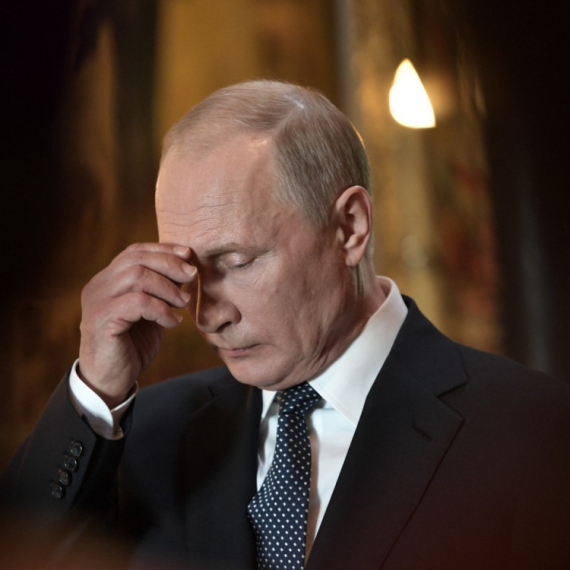Tadić: EU more distant than five years ago
Owing to the current problems within Brussels, EU membership seems further away than five years ago, says President Boris Tadić.
Saturday, 09.05.2009.
15:35

Owing to the current problems within Brussels, EU membership seems further away than five years ago, says President Boris Tadic. Tadic said that today, “owing to an unfortunate combination of post-Lisbon Constitutional confusion and the global financial crisis,” one got the impression that the EU was not currently ready to accept the Western Balkan states at the speed everyone desired. Tadic: EU more distant than five years ago Speaking at an international Political-Economic Forum in St. Gallen, Switzerland, the president said that this was why EU membership seemed more remote than five years ago. He said that regional cooperation, opening the market and harmonizing national legislation with European laws were the best way of channeling expectations in these turbulent times, and simultaneously doing all that was necessary to raise internal standards in these countries to European levels. “Even in times of uncertainty caused by the financial crisis, I want everyone to know: Serbia remains on her European course. We will continue to be committed to achieving the goals that we have set ourselves. We’ll continue to be a leader in a political, economic and cultural sense in this part of Europe of ours,” Tadic stressed. In the president’s opinion, the EU will be safer if the Western Balkans, with Serbia in its center, joins it, and if it begins to feel the positive effects of solidarity that comes from membership in the biggest peace project that the world has ever seen. Deputy Prime Minister Bozidar Djelic said that he hoped that Hague Chief Prosecutor Serge Brammertz’s next report on Serbia’s cooperation, on which Serbia’s further EU path in large part depends, would be positive and act as a basis for application of the Stabilization and Association Agreement. “I hope that Brammertz’s report [to the UN Security Council in June] will contain those famous words, ‘full cooperation with the Hague.’ Serbia is doing all in its power to complete that cooperation,” Djelic told a conference entitled “The Effects of Serbian EU Integration”. The minister told the conference at Belgrade’s Sava Center, held to mark Europe Day, that the Serbian government was trying to convince Holland to alter its position, adding that a condition for the continued integration process would be the arrest of the two remaining fugitives. He said that Serbia would be submitting its EU membership application by the end of the year. Meanwhile, European Enlargement Commissioner Olli Ren said today that Serbia had made a series of positive steps on the road to EU integration. “The Serbian government continues to be committed to progress on the European path, and has recently made a series of positive inroads,” said Rehn during his message for Europe Day. He said that stability in Kosovo had been maintained last year, adding that “compared to many regions around the world, South-East Europe has benefited from relative stability.” “If the 20th century taught us anything, it was that we mustn’t be indifferent to the Western Balkans,” said Rehn, adding that EU enlargement was focused on South-East Europe. “The Western Balkans and Turkey have a European perspective, and we’re committed to their accession as soon as they meet the conditions,” affirmed the commissioner, observing that the countries in question were making slow, but steady, progress. Boris Tadic (FoNet, archive)
Tadić: EU more distant than five years ago
Speaking at an international Political-Economic Forum in St. Gallen, Switzerland, the president said that this was why EU membership seemed more remote than five years ago.He said that regional cooperation, opening the market and harmonizing national legislation with European laws were the best way of channeling expectations in these turbulent times, and simultaneously doing all that was necessary to raise internal standards in these countries to European levels.
“Even in times of uncertainty caused by the financial crisis, I want everyone to know: Serbia remains on her European course. We will continue to be committed to achieving the goals that we have set ourselves. We’ll continue to be a leader in a political, economic and cultural sense in this part of Europe of ours,” Tadić stressed.
In the president’s opinion, the EU will be safer if the Western Balkans, with Serbia in its center, joins it, and if it begins to feel the positive effects of solidarity that comes from membership in the biggest peace project that the world has ever seen.
Deputy Prime Minister Božidar Đelić said that he hoped that Hague Chief Prosecutor Serge Brammertz’s next report on Serbia’s cooperation, on which Serbia’s further EU path in large part depends, would be positive and act as a basis for application of the Stabilization and Association Agreement.
“I hope that Brammertz’s report [to the UN Security Council in June] will contain those famous words, ‘full cooperation with the Hague.’ Serbia is doing all in its power to complete that cooperation,” Đelić told a conference entitled “The Effects of Serbian EU Integration”.
The minister told the conference at Belgrade’s Sava Center, held to mark Europe Day, that the Serbian government was trying to convince Holland to alter its position, adding that a condition for the continued integration process would be the arrest of the two remaining fugitives.
He said that Serbia would be submitting its EU membership application by the end of the year.
Meanwhile, European Enlargement Commissioner Olli Ren said today that Serbia had made a series of positive steps on the road to EU integration.
“The Serbian government continues to be committed to progress on the European path, and has recently made a series of positive inroads,” said Rehn during his message for Europe Day.
He said that stability in Kosovo had been maintained last year, adding that “compared to many regions around the world, South-East Europe has benefited from relative stability.”
“If the 20th century taught us anything, it was that we mustn’t be indifferent to the Western Balkans,” said Rehn, adding that EU enlargement was focused on South-East Europe.
“The Western Balkans and Turkey have a European perspective, and we’re committed to their accession as soon as they meet the conditions,” affirmed the commissioner, observing that the countries in question were making slow, but steady, progress.

















































Komentari 10
Pogledaj komentare